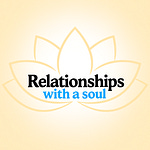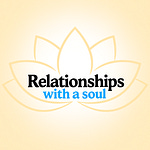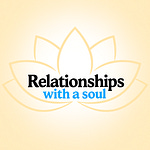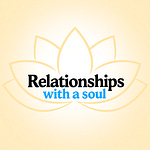Welcome to The Relationships With A Soul Podcast
Every Tuesday, I do a deep dive on a common relationship problem that more than likely, we’ve all experienced at one point or another. And some of us, are actively in these situations right now, which makes these episodes great support systems for you as you push through this problem and arrive on the other side. From observing human behavior over the last 15 years, I’ve seen a lot of the same relationship problems come up again and again. Those will be the ma in ones that we focus on here.
It is my goal that these episodes help you understand yourself better, as well as your relationships. Armed with this new info, you’ll be able to create stronger relationship dynamics with ALL your connections. Trust me, strong connections are worth more than anything money can buy. Once you understand the magic of just one of these connections, you’ll become obsessed. Now let’s get into today’s episode!
EP 28: The Grief Etiquette Most People Are Missing
Welcome to today’s episode.
Recently, someone close to me passed away and having recently been thrown into grief again, it’s really jogged my memory on all the past people I’ve been close to who have passed away. When I think about the ways that people have behaved during times like these, 2 types of people come to mind.
The types I’m referring to are:
People who don’t know how to act in these situations, which essentially means they don’t know what to say to the family or how to help
and 2
People who try to take control of the situation and manipulate things in the ways that they want, instead of honoring what the deceased person wanted.
We’re going to be discussing some examples of these types of people, and how to better approach a grieving situation so that the wishes of the deceased are respected—and friends and family of the deceased are supported in the right way.
You may be wondering what gives me the credentials to quote “know” what the right things to do and say are in these situations, and that’s a valid question.
Throughout my time studying human behavior, I’ve had the opportunity of talking to hundreds of different people who have grieved the loss of loved ones.
They’ve shared common things that they’ve really appreciated from other people during a time like this.
They’ve also shared other things that made them feel incredibly disrespected and annoyed.
In some of these cases, the actions were so bad that it resulted in the complete destruction of the relationship they had with someone.
And some of these relationships that were destroyed nearly overnight, had 50+ year histories.
Throughout the years, I’ve noted their list and have learned from it so that I can best support my own family as well as other families close to me in the best way possible. I have received feedback from these families who have let me know that I was a huge help to them moving through this process.
With that confirmation in mind, I’d like to share this list with you.
My hope is that in this episode, I will be able to share enough information with you so that by the end you will know:
A caring approach on how to support others who are grieving
What to do and also what absolutely not to do during these times of grief
Things you can do to honor the person who is deceased and support their loved ones in a respectful way.
I’d like to begin with a story from my family that highlights a common mistake I see in a lot of grieving situations. Fighting over property and not honoring the final wishes of the person who is deceased. In this story, I will not mention names because I feel that is the right thing to do here.
The story begins when my grandmother passed away 22 years ago— I remember seeing a few things throughout the process that made me raise an eyebrow.
My grandmother was catholic, and had made it very clear to her family that during the “wake” portion of her family remembrance, that she wanted a completely closed casket. She cared about her appearance, and didn’t want people to see her and remember her looking that way, even if they were able to dress her up and make her look pretty.
Going into that ceremony the closed casket was honored… At least at the beginning.
Then, one family member decided to push to have it opened up, because “they” wanted to see her.
A few family members were ok with it, most were not.
After some back and fourth arguments, the casket was basically forced open to appease what that particular family member wanted.
This went against my grandmother’s final wishes, and under no circumstances should this have been done. It still annoys me to this day that this happened.
The reason why I’m telling this story is because so often, we see that a family member’s wishes just can’t be honored, even after they’ve passed away.
Examples include:
Family members trying to challenge the will, even though it is—That person’s life, that person’s wishes, that person’s stuff
Family members changing the funeral ceremony so it better suits them.
Family members not honoring the person’s placement of ashes (if cremated) or where their body is buried as per their wishes
And then of course there is the scenario of family members changing the deceased person’s final wishes if it wasn’t included in writing.
In this case, we often find that the deceased person will tell certain family members what they want after their death, but will not put it in writing. If there is a large consensus among family of what that deceased person said while they were alive, but there is nothing in writing. That should be honored.
The main question to ask here is:
Why do people feel the need to control absolutely everything that happens in someone’s life, even after death?
Do they even realize they’re doing it?
Even further, do they realize how awful that makes them look in the public eye, in terms of society and what the majority would agree upon?
Watching this happen again and again, I couldn’t believe that people would dare change someone’s final wishes just so it suit them better. If you can’t honor a person’s final wishes in death, what does that really say about you?
I have no choice but to believe that most people who choose to act this way are either operating out of complete disconnection, anxiety, or complete overload of emotions where they just can’t handle what is going on.
Let’s get back to my grandmother’s story for a moment. I’d like to highlight another example.
That same family member who opened my grandmother’s casket, proceeded to then start an argument over possessions. The main problem here was that my grandmother’s wishes on certain possessions were not put in writing.
In this case, there was a specific ring was supposed to be left to a certain member of our family. The person challenging this, wanted the ring to go to their daughter instead.
However, over 10 family members recalled her saying who she wanted to give this ring to.. It was just never put in writing.
The argument between these 2 people went on for weeks until in the end, the majority prevailed, but that wasn’t the end of this conflict.
Those 2 people who had been caught in the feud had a 50 year relationship history and after this conflict, did not speak to each other for 15 years.
15 years of bitterness and silence, over a ring…
It truly makes me wonder how attached most of us are to our material possessions and in some cases, we value them over the connections we work so hard to build with people.
In my opinion, this is worth reflecting on.
I know that at the beginning of this episode, I shared that I have received wonderful feedback on how I’ve learned to support those who have been in tough grieving situations and I’d like to share some information on that with you so that you really can support them in the best way possible through incredibly difficult times.
Here is my list of Do’s and Don’ts that I’ve crafted from personal experience.
Let’s start with the DO’S
Please reach out to them and express your condolences in whatever way is comfortable for you. Most people in a state of grieving will appreciate hearing from you
Please let them know they don’t need to reply to your message or call you back. They’re probably receiving tons of messages and calls and are overwhelmed.
If you want to send something, send 1 thing. More than one gift can get overwhelming
Tell them a beautiful moment you remember about their loved one
Offer to help in any way that you can, but only offer it once.
If You’re someone who is around them in person: Listen often, say little (unless asked to talk about things), be present with them. Just you being there to hold them, stand by them, accompany them will mean more to them than you know
ALLOW them to feel their emotions, don’t try to stop them. Most of us are taught to silence our strong emotions when we’re children because it’s not acceptable to be loud, passionate, and expressive. This only creates buildup later on in life and it’s best to allow the energy, in this case the emotion to flow freely. Support someone who is willing to let out their emotions, even if it makes you feel uncomfortable. Just make sure they’re in a safe space while doing so.
Ok, now here are the following things that I would recommend NOT doing.
Do Not Force help on someone
Do Not Expect someone who is grieving to reply to your message or call you back
Do Not Expect to get together with that person; instead, let them decide when they are ready to see you and if they even want to see you. Do not pester them to see you after you have offered once
Do Not in any way make the situation about you. It isn’t. Period.
Do Not repeatedly send them gifts, messages, etc as a manipulative effort on your part to get their attention
Do Not Tell them everything will be ok. Why? Because that’s not for you to say. Let them decide on their own when they feel ok again.
Do not invite yourself over or show up without being invited.
If you would like any clarification on any of these recommendations from either one of these lists, please leave a comment or send me a message. I’d love to hear your inputs or add more details to any of these recommendations from this list.
I hope today’s post helped you learn a little bit more about how to support people going through grief.
If you’re struggling with a specific situation and would like my input, I welcome that in the comments. If the situation is too private, you can send me a DM. I’m confident I’ll be able to give you an appropriate direction to move in. Thanks for listening and I wish you a wonderful rest of your day.
THANK YOU for tuning in, supporting my work, and taking this journey with me to becoming a better you. Self-Growth is one of the best things we can gift ourselves with in this lifetime and I am honored that you recognize this podcast can and will help you do just that. Please feel free to leave a comment on what you thought of this episode. You’re welcome to share any struggles that you’re going through of clarification needed to better understand the episode. I respond to all comments and care about your opinions and experiences.
I’ll see you all next Tuesday where we will explore another common relationship problem and how to best approach it!
A happy week to you all!
Not subscribed? Subscribe now to get this podcast and many more self-growth info delivered right to your inbox!












